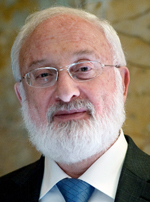
PETACH TIKVAH, Israel — The longer the pandemic lingers, the more the world will turn a blaming eye toward us, the Jews. Anytime affliction grows around the world, it directs its anger at the Jews. A few days ago, far-right white nationalist Canadian politician Travis Patron released a video stating, “What we need to do, perhaps more than anything, is remove these people, once and for all, from our country.” He’s not alone, and these ideas do not come only from the far-right. There is ample evidence of anti-Semitism on the left, as well, and even people who aren’t known for their extreme views express or share anti-Semitic social media posts.
Just like the Jews in Germany before World War II tried to convince the Nazis that they were good Germans but to no avail, Jews today are trying to convince the world that we are good people. They say that Jews donate to charity more than any other nation or faith, that they contribute to high-tech innovations that advance the world far above their proportion in the world, that Jews have given the world many great physicians, thinkers, artists, and entrepreneurs, and that they are ardent human rights activists. But the world largely responds with contempt. It may be ironic, but it seems very natural for anti-racism protesters to yell “Dirty Jews” at counter-protesters, as The Jerusalem Post reported on June 15. In other words, many people don’t even relate to anti-Semitism as a type of racism.
Jew-hatred is irrational. It doesn’t need justification (though one is always found) and it always grows when times are hard. But there is a very good explanation for it, though most Jews and most non-Jews are unaware of it.
The first Hebrew, Abraham, left his hometown, Haran, in ancient Babylon, when his countryfolk rejected him. Midrash Rabbah, Maimonides, and many other sources describe Abraham’s findings—that his people had become alienated from each other. He tried to bring them together, to help them rise above their egocentric attitude to one another. But instead of gratitude, he suffered their disdain. Eventually, they excommunicated him and drove him out of Babylon.
But Abraham succeeded. As he wandered west toward Canaan, more and more people joined him since they felt that unity above hatred is the right way to live, while those they had left behind wallowed in their hatred and eventually disintegrated. At the same time, Abraham’s people became a nation and continued to work on their unity, despite the many conflicts that arose within them. That ancient schism between Abraham’s group with its method of unity, and the rest of the Babylonians with their mindset of individuality, is the hidden root of all forms of Jew-hatred. And since the Babylonian culture had spread across the globe, there is not a single place on Earth without latent antisemitism waiting for a crisis to trigger it.
And if the ancient rupture isn’t enough to justify anti-Semitism, upon their exodus from Egypt, the Jews not only achieved complete unity (although it soon faded), but were also tasked with being “a light unto nations”—to spread that unity to the rest of the world. For nearly two millennia, the Jews had fought to keep their unity and be faithful to their mission. But some two thousand years ago, they succumbed to their egoism, which they called “unfounded hatred,” and were dispersed. Since then, they have become unfit to carry out their mission as a chosen people since their hatred for each other prevents them from spreading unity.
Because the Jews fell from brotherly love, from the motto “Love your neighbor as yourself,” into unfounded hatred, the world does not view them as the carriers of unity. But even so, it still regards them as responsible for the world’s troubles, and especially the wars. Ask any anti-Semite who is responsible for all the wars in the world, and they will tell you it’s the Jews. Although they are unaware of it, by holding the Jews responsible for all the troubles in the world, anti-Semites are saying indirectly that the Jews aren’t bringing peace. Inadvertently, they are admitting that the task the Jews were given at the foot of Mt. Sinai is still valid, and that not carrying it out is the reason for their hatred.
What then should the Jews do about it? Exactly what the anti-Semites (subconsciously) expect them to do: unite and project that unity to the world, be “a light unto nations.” Since the Jewish people are descendants of Babylonians from tribes and clans that were often sworn enemies until they joined Abraham’s group, if the Jews unite above their hatred, it will set an example and pave the way for the rest of the nations.
Ironically, the only cure for anti-Semitism is Jewish unity, and sharing it with the world. It turns out that the greatest danger to the Jewish people is not knowing their task.
*
Michael Laitman, Ph.D., studied philosophy and Kabbalah at the Russian Academy of Sciences in Moscow, and now resides in Petach Tikvah, Israel. He has published more than 40 books on a variety of topics.
Pingback: “Lipsa de unitate evreiască stimulează antisemitismul” (San Diego Jewish World) - —